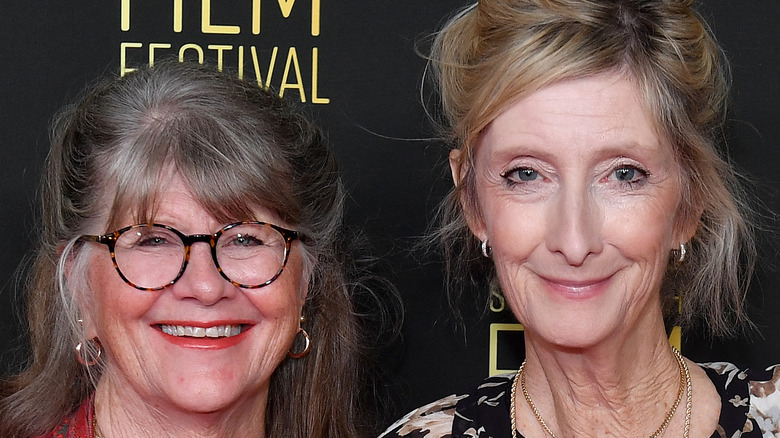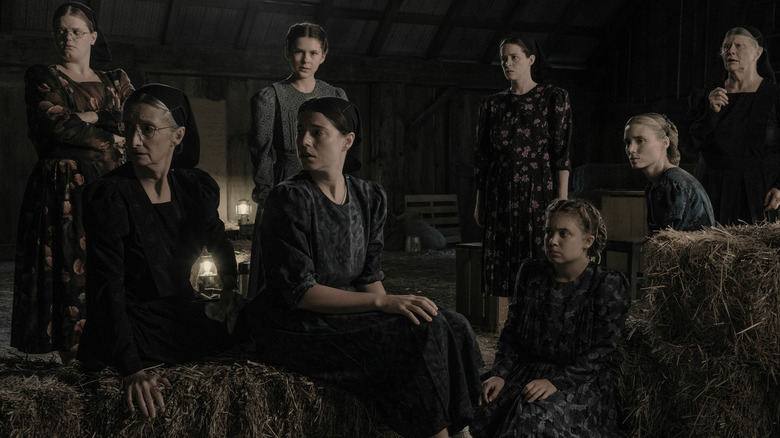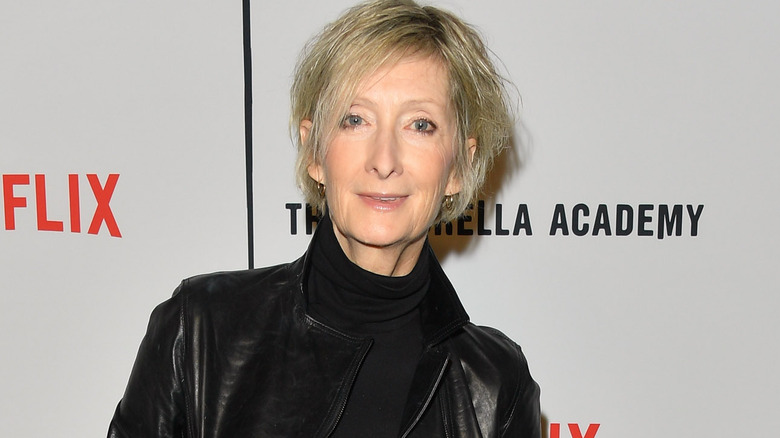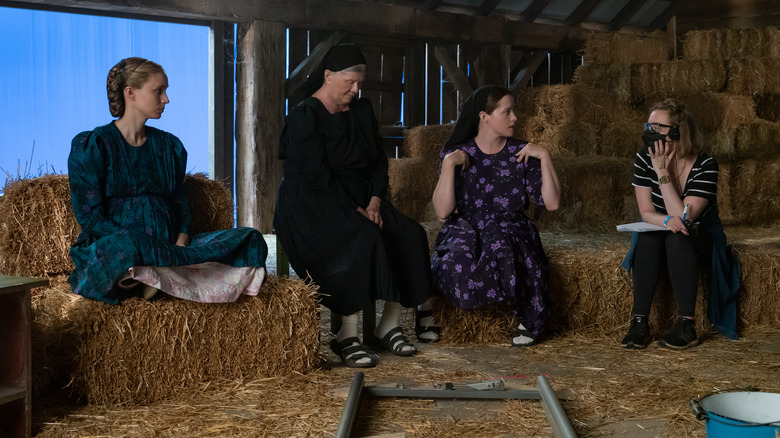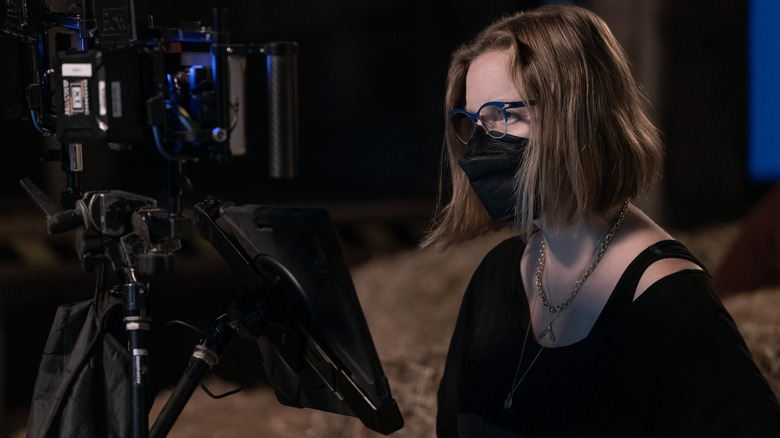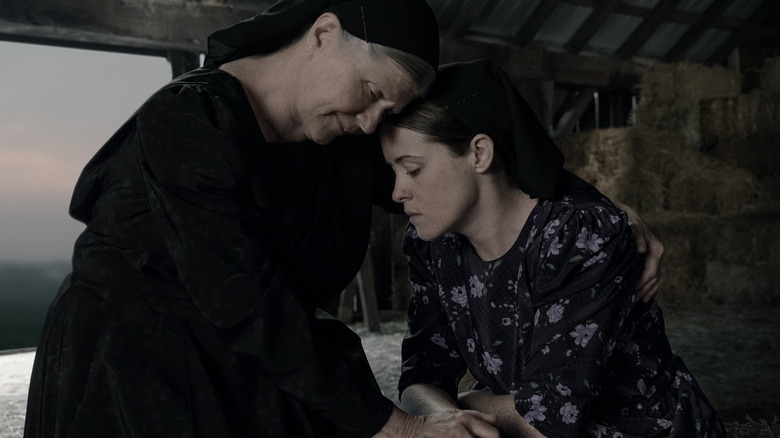Sheila McCarthy And Judith Ivey On Women's Empowerment In Women Talking - Exclusive Interview
Women's empowerment in Hollywood productions still has a long way to go. While the percentage of women working in behind-the-scenes roles has steadily increased, women still only made up 25% of total production roles among the 250 top-grossing films in the U.S. in 2021, according to the Celluloid Ceiling report, published by San Diego State University. Furthermore, the percentage of female directors working on the top 100 movies declined by 4 percentage points from 2020 to 2021.
There's one film that transcended the status quo this year by portraying a woman-centric storyline and hiring a woman-majority production crew — "Women Talking." Directed by Sarah Polley, the film recently received the Seal of Female Empowerment in Entertainment from the Critics Choice Association Women's Committee for its "prominent female character arc" and including women in major leadership roles behind the scenes.
"Women Talking" takes inspiration from a novel of the same name, written by Miriam Toews. According to The Guardian, Toews wrote the novel to depict an "imagined response" to a series of gruesome sexual assaults that happened from 2005 to 2009 in a Bolivian Mennonite community. The film illustrates a similar scenario that consists of women in a Mennonite community coming together against sexual assault, and it covers the generational trauma the survivors face, as well as many issues that are at the forefront of current discussions.
Sheila McCarthy and Judith Ivey, who respectively play Mennonite elders Greta Loewen and Agatha Friesen in the film, spoke exclusively to The List about the impact female empowerment had on the production of "Women Talking" and how the film speaks to current issues.
Women Talking covers generational trauma caused by sexual assault
"Women Talking" was unique in that we got to see the perspectives of women from multiple generations, and with your roles specifically, we got to see what the matriarchs in a Mennonite community felt in not only dealing with the trauma of sexual assault but seeing their daughters deal with that same fate. What went into preparing yourselves for that role?
Sheila McCarthy: Sarah Polley, who adapted the screenplay from Miriam Toews' original novel, which was based on a real story of a Mennonite colony — the words were very powerful that she wrote. I always go to the script, and it was so rich. Sometimes with scripts, you have to add and complicate and do backstories. This script was so dense with information, subtexts, dilemmas, conflicts, and resolutions that I kept going back to that. The characters were so beautifully three-dimensionally drawn in the script that [the script and Sarah's direction were] my Bible.
Playing one of the elders was about taking care of the generations, taking care of my daughters, taking care of my grandchildren who were also assaulted. Caring for [them] enabled my own character to heal too.
Judith Ivey: It always felt to me that the young ones were already ahead of my character in terms of going forward — what are we going to do? I love the moment when Mariche questions whether or not we should believe that the men really did this, and her daughter, Autje, says, "But we caught them." That directness and that understanding and that innocence says, "That's how we deal with this. We caught them, they're going to pay for it."
My generation is caught up in all of the religion and how I have grown up in the faith of not questioning, so I have a further journey to make than the young ones because I've got to shed a lot of baggage. I've got to rethink a lot of things in order to move forward and for us to lead the women where they need to go.
McCarthy: What we have on our side is patience. [The younger generation is] slightly more impulsive. We've left that all behind, and we can measure and take our time, even though there is only 48 hours, which drives the younger generations crazy too. "Let's make a decision. Are we going? Are we not going? Come on, let's move on this." Whereas we are [saying], "Well, let's just look at it from this side now."
I can't lie. When I was sitting and watching it, I felt like I was there, and I wanted to scream, "Come on, leave."
McCarthy: I know. That's good.
Ivey: Then we start singing a hymn. It's like, "What? Get out of there."
McCarthy: And we sing the whole hymn.
Sheila McCarthy's characters have inner awakenings
Sheila, you're also in "The Umbrella Academy," which also [has] a woman-centric storyline. What sets this role apart from that role?
McCarthy: I think Greta is her own entity; it's not about a man in her life, whereas little Agnes is very dependent on Hazel, the bad guy in "The Umbrella Academy." There's an awakening in both characters. Agnes [is] 30 years older than her suitor, which was never commented on. I thought it was so refreshing in a television series that I was actually 30 years older and it was not a problem. The producers went, "No, it's fine. It's whatever. You're in love with him. I'm okay."
The awakening for Agnes [is] to have this new love in her life. For Greta, on the flip side, her awakening is standing by her decision and fully exploring her relationship with her daughter, Mariche, and awakening to the fact that she needs to apologize. There's these new thoughts in both those characters. I love that. When I'm exploring a character, I always like to go, "What are they not good at? What are they bad at? What are their flaws?" To me, that's the most interesting part of playing a part, and both those characters are beautifully flawed.
The film featured a woman-led cast and production team
At AFI Fest, director Sarah Polley talked about how women in the cast and crew led the way, which led to things like avoiding late nights on the set and even bringing family members on the set. How was this experience different on set than other experiences?
Ivey: There were so many females working on it. I've made enough movies, starting back in the '80s, where that simply wasn't true. There were very few women on the crew, and mostly it was wardrobe if they were part of it. It was very refreshing to see female grips and people moving big machinery [who] were female. It was very comfortable. I found it a very comfortable set that way.
McCarthy: We were also very repressed with the COVID restrictions, which fed into the whole repressed world that we were creating. We weren't allowed to see anybody. Nobody came to set. We were in this huge bubble of polyester dresses and ankle socks and sandals and us living together all day long, 12 hours a day, going home to our little hovels at night, being warned not to see anybody. It was a very pure experience.
Ivey: We were all in a green room, which was a very large conference room, and hung out in between setups. We were constantly together, and one of the joyous parts of it was Rooney [Mara] had her 10-month-old, who she was still nursing, and he would run around and play with everybody. And she'd nurse, and it was like one big female family, along with Ben Whishaw — he was our only guy, our token guy.
Women Talking covers modern-day women's rights and LGBT issues
The film covered several topics that are at the forefront of conversations that we're currently having — transgender rights, and also the idea of women staying single throughout their life. How did you feel seeing these issues being covered in the context of a Mennonite community?
McCarthy: It's [a] microcosm of the world we live in now in a hayloft. You're right — I hadn't thought about Rooney's character as a woman who's electing to be alone and being fine with it. And that's Miriam Toews — she wrote that novel. Every person is very three-dimensional in it and well-drawn. [There's] the idea that Melvin has chosen not to use his voice. Again, it's "Women Talking," and the metaphors in that were so fantastic. My teeth coming out, losing my ability to talk — they were all purposeful in the film and important and relevant.
Ivey: It also gave you the distance to be able to look at it — because when the movie starts, because of that particular culture, you think you won't have anything in common [and] you're going to watch this fable unfold. And very quickly you realize, "It's the same thing we're talking about here in 2022." Unfortunately, the world hasn't changed.
In a Now Toronto article, Sarah Polley talked about how it felt to release this film in the midst of a movement that is going on right now with regard to Roe v. Wade and reproductive rights of women in the U.S. In a nutshell, she said, "Just like the stakes are high for the women in the film, the stakes are similarly high for women and securing reproductive rights." I would love to hear your perspective on this.
McCarthy: The idea that [our characters] get to vote, first of all, for the first time in our lives is massively important to me. I voted in Canada recently, and I've always found it a very moving experience to cast my vote. In this situation, [our characters are] casting a vote that is going to determine everything about our lives. It's almost a do-or-die situation, and that's very profound to me. In your country, a vote is something that you have power over, and isn't that a wonderful thing not to take for granted?
Ivey: Sarah has spoken extensively about how she wanted this to capture how a democracy begins by setting up [how] we're uneducated, we don't read, we don't write, but we knew to vote, and [we can] give everyone the right to speak up. Certainly in the United States, that's one of the things we're challenged with right now — trying to suppress voters' rights, and how is that going to affect our democracy?
McCarthy: Films should be a mirror [of] what's going on in society. If nothing else, we hope that this film provokes conversation about reproductive rights, about Roe v. Wade, about every issue that's not necessarily named in the movie but you can certainly see the parallels to.
Women Talking has a message for everyone
What message do you hope viewers take away from watching "Women Talking"?
Ivey: I always say, "I hope they take away what they need," because Sarah has tackled so many themes that I'm sure it's going to speak to people in several different ways. When a need is served, that means the door opens and change can happen. If you need to hear yourself and what you think of faith, power, abuse, sexual abuse, whatever, then hopefully you'll change.
McCarthy: It's called "Women Talking," so it's about finding your voice; leaving the theater after seeing this movie and going, "I think they have a problem and maybe we need to talk about it"; telling your own story, sharing it, which then can open up so many different directions of positive growth and hope and change and motion forward; and recognizing that everyone has a voice, everyone has a story, and it's important.
I was at a screening last week, and there was a woman beside me [who] works in women's shelters. [When] the movie ended, she was so [affected] right to her core. She couldn't talk. She was so moved. It was as though this movie was speaking just to her, and I thought, "Wow, that's what it's all about." It was amazing.
"Women Talking" will be released in select theaters on December 25 and everywhere in January.
This interview has been edited for clarity.
